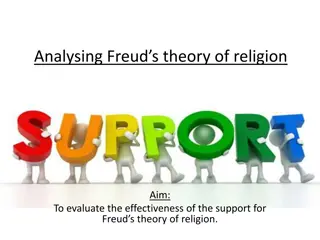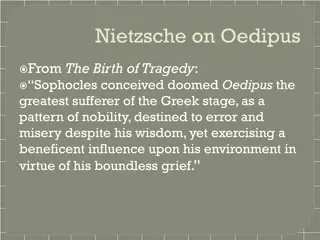Greek Tragedy: From Oedipus Rex to Sophocles' Legacy
Greek tragedy, rooted in societal changes of Greek culture, explores the arrogance of tragic protagonists like Oedipus. The form and structure of tragedies aim to evoke catharsis in audiences through a journey of fear and emotions. Playwrights like Aeschylus, Euripides, and Sophocles contributed dis
0 views • 13 slides
Critique of Freud's Theory of Religion: Examining Evidence and Key Criticisms
The analysis delves into Sigmund Freud's theory of religion, evaluating its support and challenges. The presentation highlights key criticisms regarding historical, anthropological, and psychological evidence, as well as Freud's conclusions on religion. Critiques focus on the lack of evidence for co
0 views • 19 slides
Greek Tragedy and the Role of Characters in 'A View from the Bridge'
Greek Tragedy, with its single storyline and protagonist, serves as a backdrop for analyzing characters in 'A View from the Bridge'. Oedipus, a classic tragic hero, is a powerful example of fate's inevitability. The Chorus, represented by Alfieri in the play, guides the audience through narration an
0 views • 25 slides
Analysis of Blame and Tragedy in Oedipus the King and Aristotle's Poetics
The question of blame is central in "Oedipus the King," where the city faces a plague and seeks accountability. Aristotelian concepts of tragedy, as outlined in "Poetics," delve into the structure and components of a tragic work, emphasizing plot development and cathartic emotions of pity and fear.
0 views • 28 slides
Nietzsche on Oedipus: Insights from The Birth of Tragedy
Nietzsche delves into the tragic story of Oedipus, highlighting his doomed fate, nobility intertwined with error and misery, and the profound influence of his boundless grief. Through Oedipus, Nietzsche reflects on the themes of wisdom, natural order, and the consequences of challenging nature's law
0 views • 7 slides




